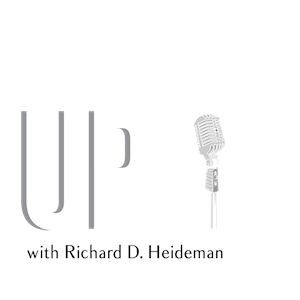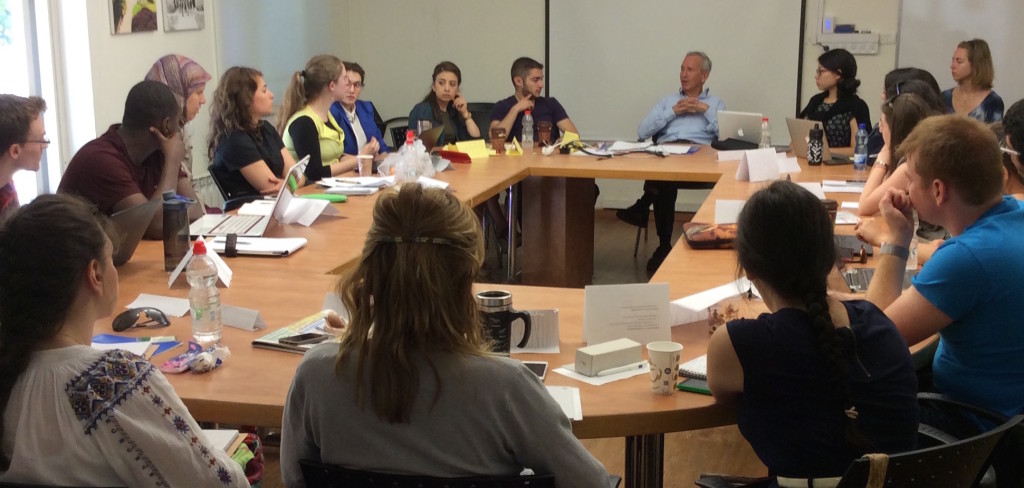Making international law meaningful in a world of conflict
In a quiet Jerusalem classroom at the Hebrew University Faculty of Law, men and women from countries as diverse as Armenia, the U.S., Singapore, Uganda, Norway and Israel responded enthusiastically to the intellectual challenges Prof. Robbie Sabel posed at the opening lecture of the three-week course on the Legal Aspects of the Middle East Conflict, conducted by the Institute for Law and Policy for international lawyers and law students.
“My background is practical,” the former Israeli diplomat told them, referring to his years as Legal Advisor to Israel’s Foreign Ministry in Washington and Jerusalem — and his decades of experience translating the seemingly arcane tenets of international law into useful interpretations in the intricate world of international relations. “We are going to deal with the real world,” he said, “with the consequences of actions, with what is legal and what is not.”
In setting the stage for some of the concepts they would analyze in the days ahead, he frequently framed them in the context of the Israeli experience, often interspersing personal anecdotes to illustrate the actual implications of the laws they were deliberating.
Employing the classic Socratic teaching method — posing questions and eliciting answers to stimulate critical thinking and illuminate ideas — Sabel invited the two dozen students to address the relevancy of international law in the current global climate.
As the discussion unfolded and the intensity of involvement increased, the varied nature of the students’ education and experience shed an interesting light on the complex issues. David Lewis, a Ugandan lawyer with Master’s degree from Harvard in International Law and Human Rights, injected his ideas, as did Evan Zimmerman, a University of Chicago undergraduate economics major. Hebrew University junior Fatme Shreef from the north of Israel, Norwegian lawyer Tamar Azulay, Siranush Harutyunyan from Armenia, and National University of Singapore law student Dione Wang contributed to the conversation. All the young people did.
Focusing the issue on the Middle East, Sabel asked whether international law is meaningful in the area where Israel is located — and more specifically whether ISIS, al-Qaeda, Hezbollah or Hamas were particularly interested in abiding by international law. Then he invited the participants to explain why even so-called “renegade states” like Libya, Syria and Iran often comply with international law when it’s not in their immediate interest. Their answers encompassed many of the topics they would be examining more specifically in their legal framework: reciprocity; reputation and respect; the threat of sanctions; and the effect of public opinion on government policy; among others.
“Every country strives for the legitimacy of international law,” Sabel said. “No country wants to be branded as violating international law. No country wants to be condemned.” He pointed out how international law brought about a tactical shift in the Palestinian pursuit of statehood — from the informal use of terror to the structured world of diplomacy. “Terrorism went from being an act against Israel to an act against the world,” he said, and began to generate global condemnation. Since international law was vital to the establishment of the State of Israel, today, the Palestinians are taking a page from the Israeli playbook, adopting the strategy of using international law to achieve their objective.
Sitting on the sidelines but definitely part of the ongoing exchange, Washington attorney Richard Heideman was observing the interaction, enjoying the experience immensely. Last year, after a hiatus of more than four decades, he returned to the Hebrew University classroom he had frequented while participating in the Law Faculty’s summer programs in 1970, 1971 and 1972. “There was a course on the Legal Aspects of the Middle East Conflict that has guided me in all my work, all my life,” he says, explaining why he had been instrumental in revitalizing the Institute for Law and Policy. The knowledge he acquired has served him well in subsequent years. As lead counsel for American victims of terror, he and his partners have successfully been awarded judgments against Libya, Syria and Iran, and have sued the Palestine Liberation Organization and other entities, including banks they have accused of funding and providing material support for terror — with various law suits still pending.
The initial hour flew by quickly. As the students’ conversation carried over into the coffee break, Heideman left to check up on the details of the Institute’s two other courses — An Introduction to
International Human Right Law and International Economic Law in an Age of Globalization — and follow up on the guest lectures, field trips and social events that were planned to round out the program. Chatting with participants earlier in the day, it was clear he hopes this new Institute will have the same lasting impact on the legal minds of the future that the previous one had on him, that the program will impel
them to practice international law for the greater good and “that participants will also return to their home countries with a greater understanding of Israeli society and the many issues and challenges facing the State of Israel.”
The Institute for Law and Policy is part of the Hebrew University Faculty of Law and is conducted in cooperation with the American Bar Association
Section of International Law, in partnership with the Jewish Federations of North America, the Israel Forever Foundation, Stand With Us, the Louis D. Brandeis Center for Human Rights Under Law and the global law firm Heideman, Nudelman & Kalik PC.
Sarabeth Lukin is an American-Israeli journalist. She lives in Jaffa.
By SARABETH LUKIN
Article originally published in Long Island Jewish World

